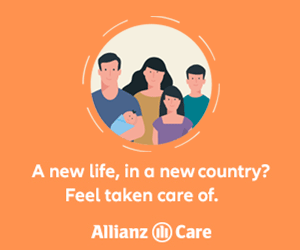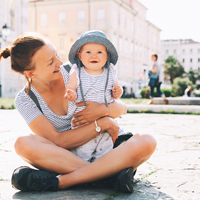Expat Life in the UAE: Dubai 101
Dubai is one of seven emirates that make up the United Arab Emirates (UAE), a country founded in December 1971. Covering an area of some 83,600 square kilometres across the Arabian Peninsula, the country consists of Abu Dhabi, the largest emirate and the location of the nation's capital; Dubai, the second-largest emirate at some 3,885 square kilometres, Sharjah, Ajman, Umm al-Qaiwain, Ra's al-Khaimah and Fujairah. With the city spanning little more than 50 kilometres from end to end, you certainly don't have to go far to find everything you'll ever need within a stone's throw.
The UAE's population stands at just over 4.1 million, with the population of Dubai, 1.2 million. The majority hail from Asia, while UAE nationals account for just 20.1 per cent of the population.
Despite being the minority in their own country, nationals of Dubai strive to maintain their traditional identity in the face of stiff competition from external forces. One obvious sign of this is in the national dress, which is worn by most UAE nationals of both sexes. The men wear a long, usually white ankle-length dress called a kandoura, or dishdash (although in the winter you'll see various colours from brown, blue, yellow and black), and, typically, a white, or red and white, headdress, called a gutra, held in place by a black woollen rope called an igal. Under-garments consist of a white skirt, known as a wazar, and a white T-shirt.
National women wear a long-sleeved black outer dress, or cape, called an abaya, often decorated with sequins while, underneath, the young are dressed in the latest fashions. Heads are covered with a scarf called a shayla, which seems to need constant adjustment. Some women also wear a thin veil, a gishwa, over their noses, while others cover their entire faces, including their eyes . . . even when driving. Many of the older generation wear a stiff mask covering their mouths, which is known as a burqa.
The language of the land is Arabic, although English ranks alongside, especially in business, and is spoken by most . . . to varying degrees.
Islam is the country's official religion and, although the UAE Constitution allows for religious freedom, Article 322 of the Federal Penal Code states that any person caught promoting any religion other than Islam without permission faces a jail term of not less than a year, or a fine of not less than Dhs5,000.
This law was brought into sharp focus by daily newspaper, Gulf News, which reported the arrest of two American women, aged 74 and 55, in Dubai in February 2005 for illegally promoting Christianity in public by distributing Bibles. Following questioning, they were bailed and released; and left the country soon afterwards. A source told the newspaper that the police had seized 19 Bibles and 26 CDs.
The newspaper also referred to a similar incident in 2003, where an elderly Philippino pastor, caught giving an open-air sermon in Ra's al-Khaimah, was convicted of promoting Christianity without obtaining permission, and sentenced to a year in jail. Although the clergyman had official permission to preach inside a church, he was unaware the authorisation did not extend outside. However, the courts handed down a suspended sentence in consideration of the man's age.
According to Dubai's Department of Tourism and Commerce Marketing's (DTCM) website, 'nationals of 'Israel' may not enter the UAE.' So resolute is this ban that the British Passport Office has been known to issue second passports to Dubai-resident Britons wishing to visit Israel, so that Israeli entry/exit stamps don't appear in the same passport as that containing a Dubai residence visa.
The hype
Dubai has been a huge PR success. While effectively distancing itself from the fundamentalist/terrorist stereotype with which the Middle East has, for some, become labelled, especially post-9/11, it has been able to present itself as a moderate, liberal enclave of peace and prosperity.
In recognising its supplies of oil were finite (reserves are estimated to run dry by 2010), Dubai has sought to invest in opportunities that reduce its dependence on the black gold. As such, it's wooed the world by creating an infrastructure that's esoteric, eccentric, practical, foolish and incredible; an infrastructure that wholly embraces concepts whose origins can be traced to the REM sleep of some of the world's most creative architects.
Yet while the infrastructures of London, Singapore, Paris and New York have evolved organically over centuries, in parallel with the maturing mindset of the cities' inhabitants, Dubai's petrodollars have been used to create a 21st-century infrastructure in mere decades; in fact you'll find nearly 25 per cent of the world's cranes ' some 30,000 ' dotting Dubai's cityscape.
Unfortunately, it's inevitable the city's mindset will take some years to catch up with its infrastructure. The resulting incongruity and imbalance has, for many, been extremely difficult to reconcile, especially by new arrivals who, dazzled by the city's fantastic infrastructure, expect too much from a city whose attitudes have a long way to go to match their own.
So ubiquitous is this mindset that many long-term expatriates, some of whom have lived in Dubai since the 1970s (and before), have ceased to evolve from the day they first stepped off the plane or boat; and many have, in fact, regressed to such an extent that, if they were to return to their home countries, the culture shock would be untenable. This is both exacerbated and perpetuated by an attitude of, '"Well if you don't like it . . . leave"', a point of view that allows for no dissention, no challenge to the status quo and no evolution, which has ultimately led to the perception of Dubai being a city of transience.
In 2006, General Sheikh Mohammed bin Rashid Al Maktoum, the Ruler of Dubai and the country's Prime Minister and Vice-President, a keen poet, published a book: "My Vision: 'Challenges on the Road to Excellence, in Arabic and English".
Now required reading in all secondary schools, according to the Gulf News, Sheikh Mohammed reveals his vision for Dubai to reach the status of the world's most powerful cities and outrun them in every aspect and at all cost; and lead the world in the race towards globalisation. His plans also seek to empower UAE nationals to take over certain roles currently undertaken by non-nationals and, as such, expatriates might be wise to consider Dubai a short-term sojourn, a dip of the toe into a different culture and mindset. To reinforce this attitude, officials at the Ministry of Labour told the United Nations in mid-2006 that expatriates in the UAE should not be regarded as immigrants, but rather as temporary workers who return home after their work contract expires.
Lamb dressed as mutton
Dubai is a study in nouveau riche: vulgar and opulent. For many, it is a master of the opaque, of smoke and mirrors, and is perceived as having little regard for fair play. Someone once said that: 'The difference between Dubai and Disney World is that Disney World knows it's a fantasy'.
Dubai is also the land of great opportunities where almost anything's possible if you have the get-up-and-go to get it done. Where one person's plan might fail, another's will succeed if he or she knows the right people.
There are seldom any boundaries with what can and can't be done, but laws are ambiguous, non-existent and not seen to be enforced so, in the ensuing confusion, it's often best to try something and later apologise for it if it's wrong, rather than not try it at all.
On a final note, although life can still be harsh in Dubai, please do keep in mind that many people enjoy a great time in the emirate (and have no wish to leave). One major plus point is that, if you do decide to move to Dubai, you'll meet an eclectic, friendly mix of people, from all walks of life; find you have much in common and gain friends for life.
From Living and working in Dubai by Pippa Sanderson.
Copyright Pippa Sanderson
Published by Pyjama Publishing (www.pyjamapublishing.com)
ISBN: 978 0 9553396 0 8
Price: BP9.95
Extent: 256 pages
Format: Softback
Rights: Worldwide
Illustrations: More than 150 colour photographs
About the Author
 Living and working in Dubai is written by a former UK police officer and long-term resident of Dubai. As Books Editor for a leading publisher in the Middle East, the author spent much of her time editing or carrying out research for books about the region, particularly the United Arab Emirates and Sultanate of Oman. As a result, she has been able to encapsulate the idiosyncrasies and incongruities of the city in one volume, with informative text and more than 150 colour photographs.
Living and working in Dubai is written by a former UK police officer and long-term resident of Dubai. As Books Editor for a leading publisher in the Middle East, the author spent much of her time editing or carrying out research for books about the region, particularly the United Arab Emirates and Sultanate of Oman. As a result, she has been able to encapsulate the idiosyncrasies and incongruities of the city in one volume, with informative text and more than 150 colour photographs.
She is a keen photographer and took all the images for this book, bar four. She is also a member of the UK's Chartered Institute of Journalists and the Society of Authors.
Additional Information:
- UAE Guide
- Healthcare & Health Insurance in UAE
- Members Talk about Healthcare & Health Insurance in UAE
- Best Places to Live in UAE
- Real Estate in UAE
- Guide to Real Estate in UAE
- Pros & Cons of Living in UAE
- Cost of Living in UAE
- Pros and Cons of Living in the UAE
- How to Rent a Home in the UAE
- Enrolling in the Public Healthcare System in the UAE
- 10 Best Places for Families to Live in the UAE
- Pros and Cons of Living in UAE 2024

 The UAE
The UAE

